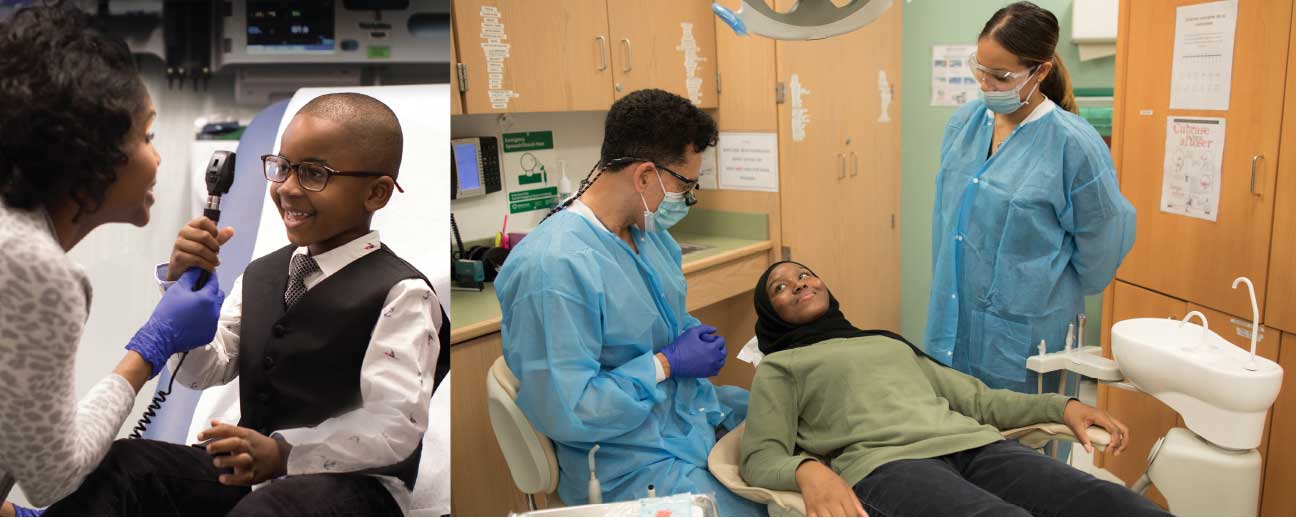Fathima Lye remembers her high school health center as “very welcoming. You could stop by without an appointment even if you just wanted to have a chat with one of the nurses. It provided a safe space.”
Ms. Lye says she and her classmates could count on access to healthcare—whether they were feeling ill or anxious, had questions about sexual health, or even had a toothache.
“Having access to the health clinic at school made me take charge of my own needs,” she says. “And the care that you get is the same as what you would receive at a local health provider, except that it’s more convenient.”
Ms. Lye’s alma mater is one of 94 schools that receives comprehensive care through the 31 Montefiore School Health Program (MSHP) health centers. Those school-based centers reach more than 42,000 children in pre-kindergarten through 12th grade—25% of all public-school students in the Bronx.
“Healthcare providers at each site deliver services such as primary-care visits, mental health counseling, dental care, chronic disease management, emergency care, and health education, a model that has been tremendously successful,” says program director Rosy Chhabra, Psy.D. Kids with access to school-based healthcare are 40% less likely to go home sick, for example, which means stronger school performance for the kids and less missed work for their parents.
Healthcare providers at each site deliver services such as primary-care visits, mental health counseling, dental care, chronic disease management, emergency care, and health education, a model that has been tremendously successful.
— Dr. Rosy Chhabra
And learning health literacy along with academics can have a lifelong impact. “I saw a model that showed the shocking amount of sugar in juice and soda,” Ms. Lye says. “Those visuals made me much more aware of what I was drinking.”
Adds Dr. Chhabra, “This is the perfect time to reach children, while they are dealing with the physical, mental, and emotional issues surrounding growing up. If you involve them in learning to care for their health when they’re young, those lessons stay with them for the rest of their lives.”
Former director David K. Appel, M.D., who founded the program 35 years ago and continues to consult, says the MSHP has developed “in ways beyond what we ever imagined. We started with the expectation that all children should have access to health services they need and took it from there.”

If you involve them in learning to care for their health when they’re young, those lessons stay with them for the rest of their lives.
— Dr. Rosy Chhabra
Dr. Chhabra has researched disease prevention and school health nationally and internationally, but she says that, to her, the Bronx is special. “It’s a high-needs community, one of the poorest in the country,” she says, with disproportionately high rates of asthma, diabetes, obesity, mental illness, and other health conditions. “At the same time,” she adds, “I’ve found that the Bronx is a community of amazing strength and resources. In my experience, the reason that programs are successful is that the community takes ownership.”
This approach has resulted in more-effective—and more-efficient—healthcare for children. Emergency room visits and hospitalizations for children with asthma dropped by half after students started receiving treatment through the MSHP. Hospital costs for children with diabetes were cut by nearly one-third.
Dr. Chhabra is especially proud of the MSHP’s mental health outreach for issues such as anxiety and depression. “Students are better prepared to ask for help when they need it—and to actually receive care before problems become more severe,” she says. Nearly all students referred for mental-health help follow up with counselors in their schools. Before that was available, only about one in 10 of those referred actually sought help in the community.
Two years ago, under Dr. Appel’s leadership, the MSHP began to lay the groundwork for an optometry program in MSHP schools. He and Dr. Chhabra expect all of the clinics to conduct eye exams in three to five years. Children who need eyeglasses will get a free pair, courtesy of eyeglass maker Warby Parker.
I’ve found that the Bronx is a community of amazing strength and resources. In my experience, the reason that programs are successful is that the community takes ownership.
— Dr. Rosy Chhabra
While the MSHP’s record in the Bronx is impressive, Dr. Chhabra plans to standardize programs so that they can easily be adopted by other cities. “We have the opportunity to be a model for the nation,” she says. Achieving those ambitious goals requires investment from both public and private partners. “School health can be transformative,” Dr. Chhabra says. “It becomes the heart of health for the community. If we can secure the funding to make that happen, the payoff is huge.”
Mrs. Aronson, who has spent time at MSHP centers in the Bronx, says that she could easily see the model replicated in other cities. “I have worked in other high-need cities, and I can say with certainty that a model like this could change the trajectory of children’s health outcomes and contribute to family stability at remarkable scale,” she says.
“We have something that can really move the needle—and, with the right partners and supporters in place, transform entire communities,” she adds. But for her, the real measure of success is students such as Ms. Lye, who, Mrs. Aronson says, “go on to college and career and pay it forward.”
Ms. Lye, who is now in college, says that her experience with the program cemented her plans to pursue a career in nursing. “It opened my eyes. When you give students the resources to take care of their health, they’re better equipped to create healthy communities.”

Key to the success of Montefiore’s School Health Program (MSHP) has been the advocacy and public policy work at the city, state, and federal levels. MSHP is a lead member of the New York School-Based Health Alliance (SBHA), which has been instrumental in advancing these efforts. The New York SBHA is part of the national SBHA, founded in 1995, which serves as a voice for school-based healthcare programs across the country.
By providing resources, training, and advocacy for health and education partnerships, with a particular focus on the school-based health clinic model, the New York SBHA is a strong voice in supporting common standards, encouraging experiential learning, and inspiring young people to take responsibility for their own health.
MSHP partnered with the Primary Care Development Corporation to develop the first national standards for school-based health centers, adopted nationwide in November 2017.